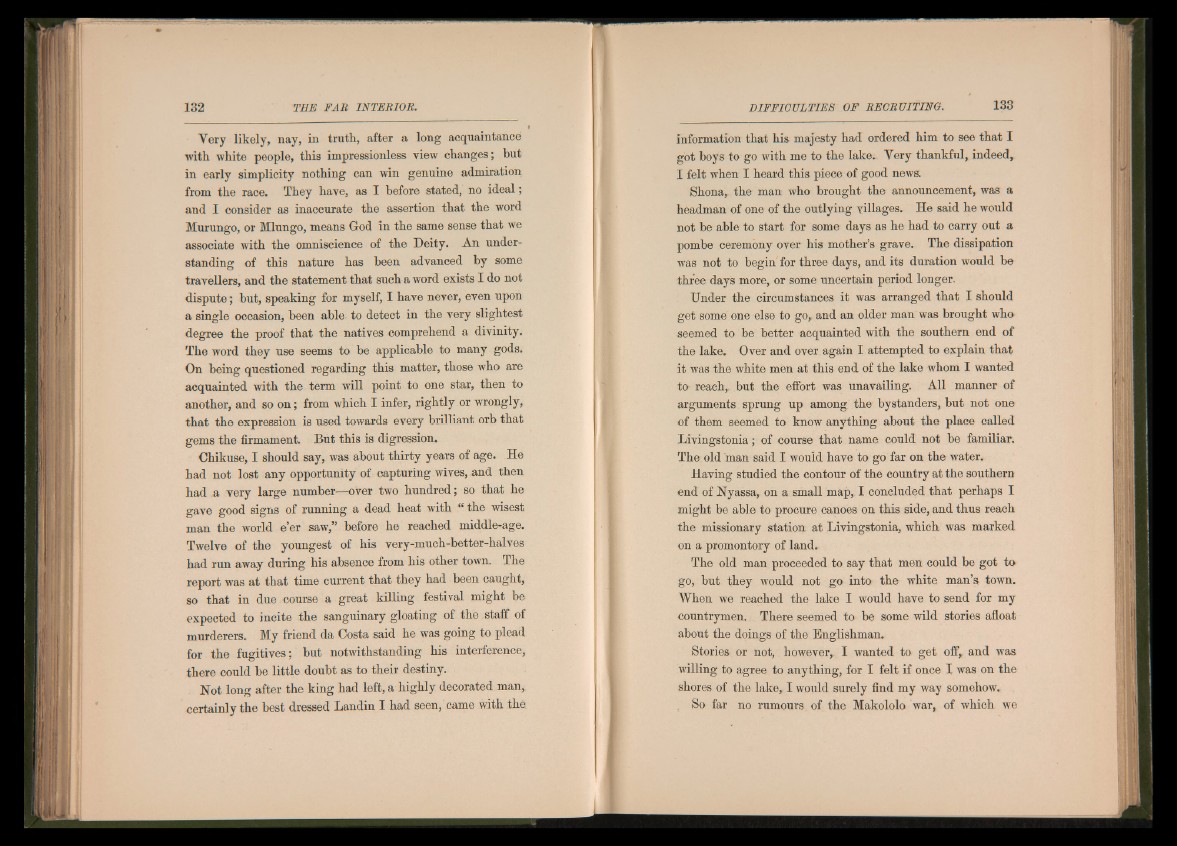
Very likely, nay, in truth, after a long acquaintance
with white people, this impressionless view changes; hut
in early simplicity nothing can win genuine admiration
from the race. They have, as I before stated, no ideal;
and I consider as inaccurate the assertion that the word
Murungo, or Mlungo, means God in the same sense that we
associate with the omniscience of the Deity. An understanding
of this nature has been advanced by some
travellers, and the statement that such a word exists I do not
dispute; but, speaking for myself, I have never, even upon
a single occasion, been able to detect in the very slightest
degree the proof that the natives comprehend a divinity.
The word they use seems to be applicable to many gods.
On being questioned regarding this matter, those who are
acquainted with the term will point to one star, then to
another, and so on; from which I infer, rightly or wrongly,
that the expression is used towards every brilliant orb that
gems the firmament. But this is digression.
Chikuse, I should say, was about thirty years of age. He
had not lost any opportunity of capturing wives, and then
had a very large number—over two hundred; so that he
gave good signs of running a dead heat with “ the wisest
man the world e’er saw,” before he reached middle-age.
Twelve of the youngest of his very-much-better-halves
had run away during his absence from his other town. The
report was at that time current that they had been caught,
so that in due course a great killing festival might be
expected to incite the sanguinary gloating of the staff of
murderers. My friend da Costa said he was going to plead
for the fugitives; but notwithstanding his interference,
there could be little doubt as to their destiny.
Not long after the king had left, a highly decorated man,
certainly the best dressed Landin I had seen, came with the
information that his majesty had ordered him to see that I
got boys to go with me to the lake. Very thankful, indeed,
I felt when I heard this piece of good news.
Shona, the man who brought the announcement, was a
headman of one of the outlying villages. He said he would
not be able to start for some days as he had to carry out a
pombe ceremony over his mother’s grave. The dissipation
was not to begin for three days, and its duration would be
three days more, or some uncertain period longer.
Under the circumstances it was arranged that I should
get some one else to go, and an older man was brought who
seemed to be better acquainted with the southern end of
the lake. Over and over again I attempted to explain that
it was the white men at this end of the lake whom I wanted
to reach, but the effort was unavailing. All manner of
arguments sprung up among the bystanders, but not one
of them seemed to know anything about the place called
Livingstonia; of course that name could not be familiar.
The old man said I would have to go far on the water.
Having studied the contour of the country at the southern
end of Nyassa, on a small map, I concluded that perhaps I
might be able to procure canoes on this side, and thus reach
the missionary station at Livingstonia, which was marked
on a promontory of land.
The old man proceeded to say that men could be got to
go, but they would not go into the white man’s town.
When we reached the lake I would have to send for my
countrymen. There seemed to be some wild stories afloat
about the doings of the Englishman.
Stories or not, however, I wanted to get off, and was
willing to agree to anything, for I felt if once I was on the
shores of the lake, I would surely find my way somehow.
So far no rumours of the Makololo war, of which we